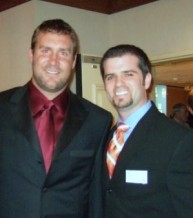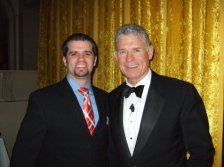Does God promise you a spouse in the Bible?
. ..that was the question that Rob Eagar over at thelife.com proposed recently. His post tried to answer this question in the affirmative. Many evangelicals through the years have often painted a picture that God promises a spouse to all believers. Except there is one problem, no where in scripture does God make this promise.
..that was the question that Rob Eagar over at thelife.com proposed recently. His post tried to answer this question in the affirmative. Many evangelicals through the years have often painted a picture that God promises a spouse to all believers. Except there is one problem, no where in scripture does God make this promise.
Eagar said:
Does God promise us a spouse? The Bible says “yes” by describing Christians as the spiritual bride of Christ. Our true spouse is Jesus. Yet, many of us say, “I’m glad to be spiritually married to Christ, but I can’t feel Him. Wouldn’t it be better if I could enjoy God’s love with someone else? I want Jesus with skin on.” So, we pray for God to bring us an earthly mate.
This type of theology has created a generation of frustrated Christian singles. No where in scripture does God promise a wife or husband to a believer on the sole basis that they are a Christian. Christians are not the spiritual bride of Christ. The spiritual bride of Christ is the Church (ecclesia). Some would say Christians make up the church, thus Christ is our bride. Maybe (that is pretty loose theology), but not in the erotic sense. However, scripture is clear where we get this “bridal theology” from, such as Ephesians 5:25:
Husbands, love your wives, just as Christ loved the church and gave himself up for her.
Here, Paul speaks about the love that exists between a husband and wife and mirrors that love in non-erotic language (Paul uses agapate to describe this love) to describe the relationship between the Church and Jesus. Agnieszka Tennant, writing for CT, posted this article about the over use of love language with Christ. Her most telling quote reveals the trouble with the over use of the love language of God:

 for us into Christianity.” – is the comment that I heard from a wedding I once officiated. Over the years, I have been conflicted by couples who come into my office asking me to officiate their wedding. Normally, I have no problem doing a wedding for a church member or Christians who do not have a church home. What has been a growing trend for a number of pastors, including myself, is what to do with non-Christian weddings?
for us into Christianity.” – is the comment that I heard from a wedding I once officiated. Over the years, I have been conflicted by couples who come into my office asking me to officiate their wedding. Normally, I have no problem doing a wedding for a church member or Christians who do not have a church home. What has been a growing trend for a number of pastors, including myself, is what to do with non-Christian weddings?

 Meteorology has always been a fascination of mine. I would watch the TV and check out the internet websites that forecasted major weather events like hurricanes and snowstorms. Weather storms are an interesting meteorological event. Storms can be predicted but never do they present themselves as the weather forecasters predict. Every summer and fall, hurricane predictors try to figure out how many major storms will hit land. As we have seen from hurricane Katrina, storms can catch us off guard and teach us that we must be careful how we prepare for storms.
Meteorology has always been a fascination of mine. I would watch the TV and check out the internet websites that forecasted major weather events like hurricanes and snowstorms. Weather storms are an interesting meteorological event. Storms can be predicted but never do they present themselves as the weather forecasters predict. Every summer and fall, hurricane predictors try to figure out how many major storms will hit land. As we have seen from hurricane Katrina, storms can catch us off guard and teach us that we must be careful how we prepare for storms.



 (not that bad), and algebra II (got C’s and past, barely). I took at practical math class my senior year in high school where I learn to balance a check book, learned about mortgages, understood the stock market, and all sorts of practical mathematical concepts. I got A’s in that class! The issue I found with mathematics is that the vast majority of equations and problems you have to solve have one answer. For some reason, my mind was more suited to the humanities like government, history, art, and english (sort of). In those classes, the answer was usually subjective. In the humanity classes, thinking and discussing were at the center of learning. Memorizing math formulas and the rules of math was difficult. Every time I got a concept in math class we would move on to another concept. I could not keep up!
(not that bad), and algebra II (got C’s and past, barely). I took at practical math class my senior year in high school where I learn to balance a check book, learned about mortgages, understood the stock market, and all sorts of practical mathematical concepts. I got A’s in that class! The issue I found with mathematics is that the vast majority of equations and problems you have to solve have one answer. For some reason, my mind was more suited to the humanities like government, history, art, and english (sort of). In those classes, the answer was usually subjective. In the humanity classes, thinking and discussing were at the center of learning. Memorizing math formulas and the rules of math was difficult. Every time I got a concept in math class we would move on to another concept. I could not keep up! ven though it takes three different modes. The same can be said of the Trinity. God is still God, but just in three forms that share similar properties made up of one substance. It’s crazy, I know. Similes and metaphors get us close to an idea, but never fully explain it. Trying to explain God is like trying to explain an emotion. Words that can fully describe it. How do you describe the Divine? How do you describe something greater than ourselves? We have some pretty good ways of describing God, but nothing can fully explain God. There is a certain mystery there that we are meant to be in awe of.
ven though it takes three different modes. The same can be said of the Trinity. God is still God, but just in three forms that share similar properties made up of one substance. It’s crazy, I know. Similes and metaphors get us close to an idea, but never fully explain it. Trying to explain God is like trying to explain an emotion. Words that can fully describe it. How do you describe the Divine? How do you describe something greater than ourselves? We have some pretty good ways of describing God, but nothing can fully explain God. There is a certain mystery there that we are meant to be in awe of. 
 For the last 20 or 25 years, it has become popular a church to build their worship and ministry space to look like a warehouse or storehouse (or use an actual warehouse). After being a part of three capital improvement projects at three different churches, I have found there is a whole theology to church buildings.
For the last 20 or 25 years, it has become popular a church to build their worship and ministry space to look like a warehouse or storehouse (or use an actual warehouse). After being a part of three capital improvement projects at three different churches, I have found there is a whole theology to church buildings. vention.
vention.

You must be logged in to post a comment.